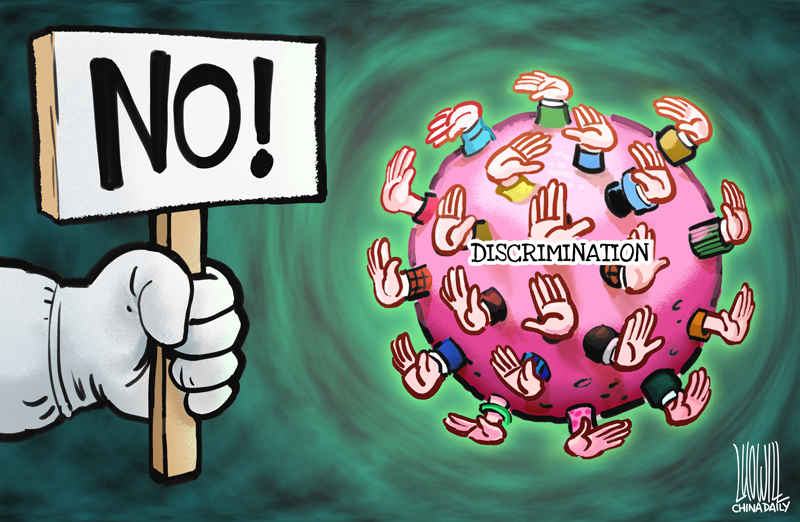No room for stigmatization in fighting COVID-19


It has been five weeks since the World Health Organization named novel coronavirus pneumonia COVID-19, a term that is now widely used across the world, including in every speech I listened to from European Union leaders in the past weeks.
However, that has not been the case in the United States, where the top leader and top diplomat have continued to refer it as “Chinese virus” or “Wuhan virus”, a stigmatization the WHO warned against.
The WHO, in naming the disease COVID-19, said it wanted to avoid referring to the virus by a geographical location, an animal, an individual or group of people. Director-General Tedros Adhanom Ghebreyesus said having a name matters to prevent the use of other names that can be inaccurate or stigmatizing.
So it’s not a surprise the deliberate use of stigmatized names by top US officials has drawn condemnation from Chinese foreign ministry and opinion leaders.
Michael Swaine, a senior fellow and a China expert at Washington-based Carnegie Endowment for International Peace, called it “furthering the disgusting and frankly racist tactic of labeling COVID-19 a ‘Chinese’ virus”.
New York Times columnist Nicholas Kristof said “there is a long and brutal xenophobic history of blaming foreigners for diseases, and we bungled our own response to COVID-19 so badly that we shouldn’t make scapegoats of others”.
Jorge Guajardo, a former Mexican ambassador to China, criticized the US leader for using the virus to inflame racism.
The US leader embarrassed himself in his effort to stigmatize China and distract the US public from its government’s major missteps in fighting COVID-19.
This is indeed no time for stigmatization when the world faces a “defining global crisis of our time”, as Tedros described.
Tedros said it well. Crises like this tend to bring out the best and worst in humanity. He cited touching videos of people applauding health workers from their balconies, and stories of people offering to do grocery shopping for older people in their community.
I have seen those videos taken from Wuhan, Hubei province and other Chinese cities, as well as videos about Italians singing songs on balconies to show solidarity during their city’s lockdown.
On Monday, Tedros also commented on my tweet about Chinese and Italians helping each other in times of crisis, from the devastating 2008 Wenchuan earthquake when an Italian rescue team saved hundreds of lives in Sichuan to a Chinese medical team comprising mostly of experienced doctors from Sichuan sent to Italy to help fight COVID-19.
“Heartwarming example of solidarity #Italy #China. We all need to unite and support each other in the fight against COVID-19, a common enemy,” he said.
At the Monday press conference, Tedros stressed that the amazing spirit of human solidarity must become even more infectious than the virus itself.
China, which has been recovering relatively well from the outbreak, is lending a hand to other countries. It has been sending medical supplies and medical teams to countries to help fight COVID-19.
As one who has covered the WHO virtual press conferences for more than a month, it’s heartbreaking to see the situation deteriorating in many countries. If the world had heeded the repeated warnings by the WHO weeks ago to seize the window of opportunity and get prepared, many countries would have been in a much better position today.
The past days have seen more countries waking up and adopting unprecedented tough measures. But the global fight against COVID-19 won’t succeed unless world leaders show solidarity with each other instead of trying to blame others for their problems.
The author is chief of China Daily EU Bureau based in Brussels.

































